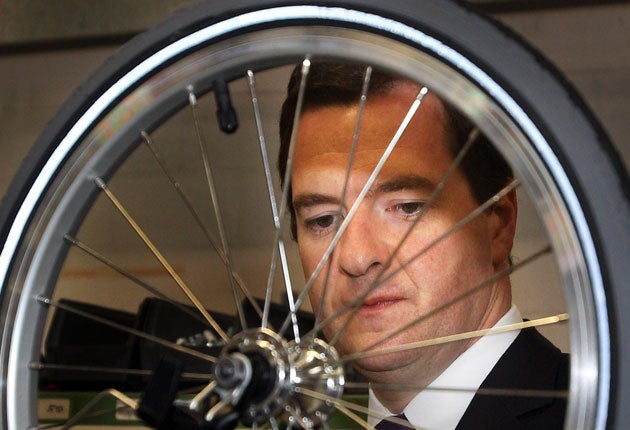Andrew Grice: Osborne can use all the spin he likes – it won't help the economy grow any quicker
Inside Westminster


"Things can only get better" worked as a slogan as well as a theme tune for Labour at the 1997 election. "Things could be even worse than they are" is George Osborne's song today. It will never top the charts.
Economically, the Chancellor is right. The feeble growth of 0.2 per cent between April and June announced this week was nothing to celebrate, but it was not a disaster. The Chancellor was able to call Britain "a safe haven in the storm" blowing over sovereign debt in America and the eurozone.
Politically, "we could be as badly off as Greece but we're not" is pretty lame. Luckily for Mr Osborne, his party does not have a general election to fight any time soon. He and David Cameron tried to strike a sunny note as they responded to the gloomy GDP figures. Some Conservative MPs fear Coalition leaders contributed to the economy's current weakness by overdoing the need to cut the deficit as they justified their deep spending cuts last year. They can hardly blame ordinary people for clearing their debts too, which is now contributing to the lack of consumer spending.
Similarly, banging on about the Government's "growth strategy" doesn't make the economy grow overnight. There will be a blizzard of initiatives this autumn but most will take years to bear fruit. It would have been better to have had a proper growth strategy last autumn.
Ministers are conducting a holding operation in the hope that things really do feel better in 12 months. "We are looking for the Olympics to generate a feel-good factor," one Cabinet minister told me. I doubt it. People will enjoy the Games but that won't necessarily make them feel good about rocketing energy prices or their pay freeze at a time of relatively high inflation. I suspect politicians underestimate the toxicity of the huge squeeze on living standards.
In hard times, they press their default button – our old friend tax cuts. Which to most voters will look odd because there is no money for giveaways. True, the International Monetary Fund suggested that emergency tax cuts could kickstart the economy if it proved necessary – the Plan B that the Government might end up pursuing while insisting that it is sticking to Plan A.
Ed Balls, the shadow Chancellor, renewed his call for a temporary cut in VAT, arguing that the rise to 20 per cent in January had proved an own goal. Meanwhile, Mr Osborne raised the flag of "cutting business taxes, and doing away with very high tax rates that only damage growth and enterprise."
That was seen as a hint that he will abolish the 50p higher rate of tax on earnings over £150,000 a year. The Tories regard it as temporary and, led by the London Mayor, Boris Johnson, are queueing up to slay it. Labour is divided over whether to keep or abolish the 50p band, an added incentive for Mr Osborne to act. But cutting taxes for the rich few would anger many of the 11 million on low and middle incomes.
The Chancellor will need ammunition and cover. He hopes to find them from lower tax receipts than the Treasury forecast when Labour announced the new higher rate. Tory MPs hope the rich are as adept as usual at avoiding taxes aimed at them, allowing Mr Osborne to argue that the 50p rate is not worth the candle. Even if an economic case can be made for axing it, that would be bad politics. The Chancellor may have to wait until he can also offer tax cuts much lower down the income scale. That is his game plan for the next election – ideally, a downpayment before polling day or, if it takes longer to balance the books, a manifesto pledge to reduce taxes. Some allies do not rule out a headline-grabbing cut in the 20p basic rate.
Ed Miliband was quick to grasp the "squeezed middle" issue last autumn, even though he was mocked for being unable immediately to define it. Labour's policies will be devised with this key group in mind. However, the word from Team Osborne is that the Chancellor is more than happy to fight the next election on this terrain because it is the Tories' natural turf. If voters were promised tax cuts by the two biggest parties, he judges, they would instinctively believe the Tories rather than Labour.
The tax cuts debate is premature, as the Liberal Democrats had the good sense to point out. Vince Cable, the Business Secretary, had a dig at both Tory and Labour tax-cutters by dismissing their "voodoo economics". To stay on message, Mr Cable calls his Plan B a "Plan A plus". It would include another round of printing money (quantitative easing), a route the Bank of England may well need to take.
Liberal Democrat ministers remain solid on the Government's deficit-reduction plans. They would have no credibility if they pulled the rug, which would risk the very stability which is the Coalition's raison d'etre.
But the Liberal Democrats are becoming impatient. They were noticeably less positive about Tuesday's weak figures than the Tories. If things really don't get better by the autumn, they may rattle Mr Osborne's cage in public.
After blaming the snow, the sun, the Royal Wedding and the Japanese earthquake, Mr Osborne is running out of the wrong type of excuses.

Join our commenting forum
Join thought-provoking conversations, follow other Independent readers and see their replies